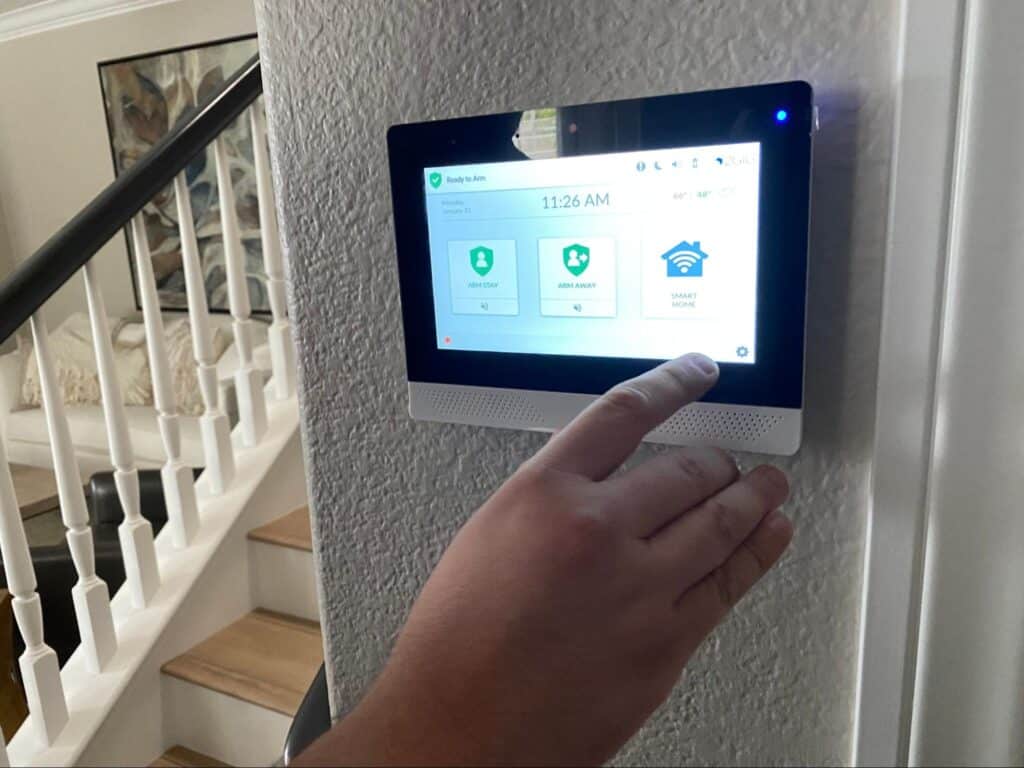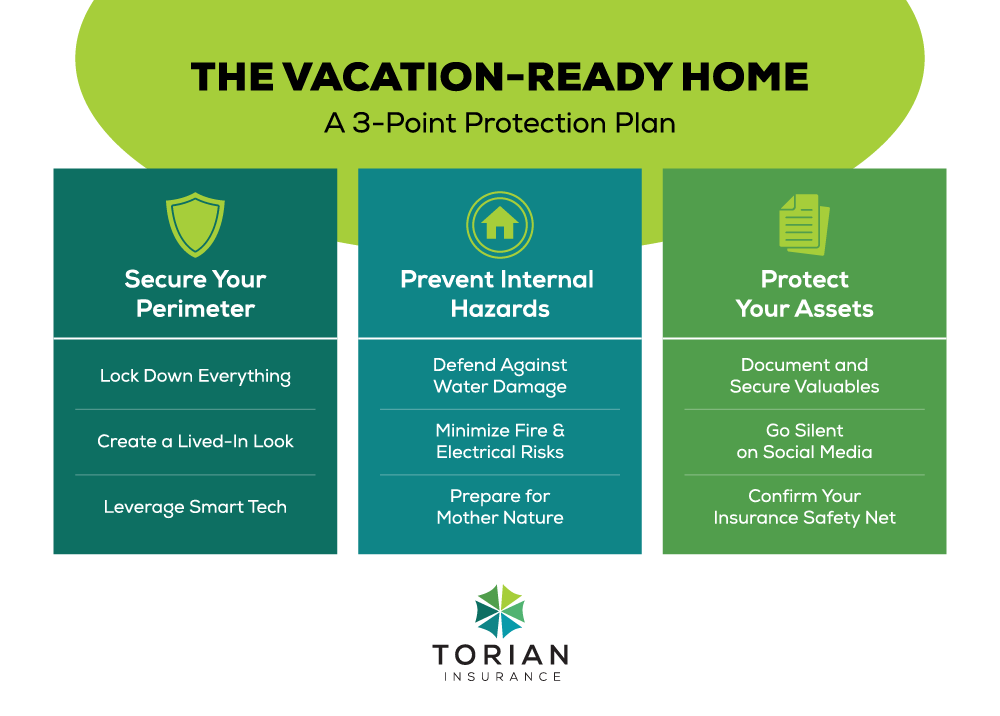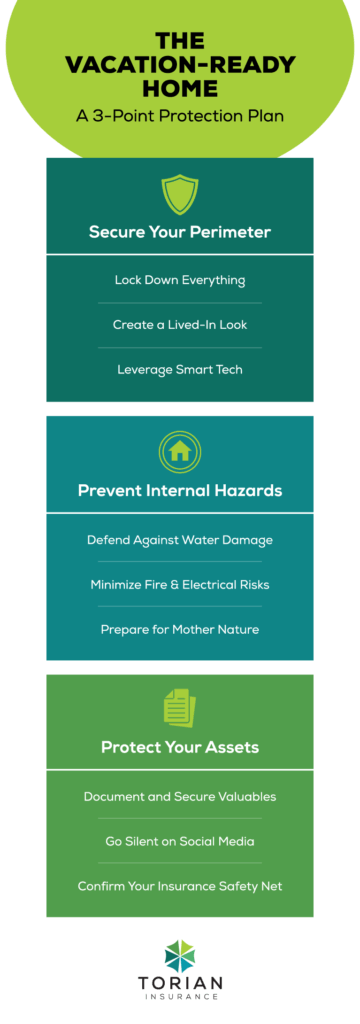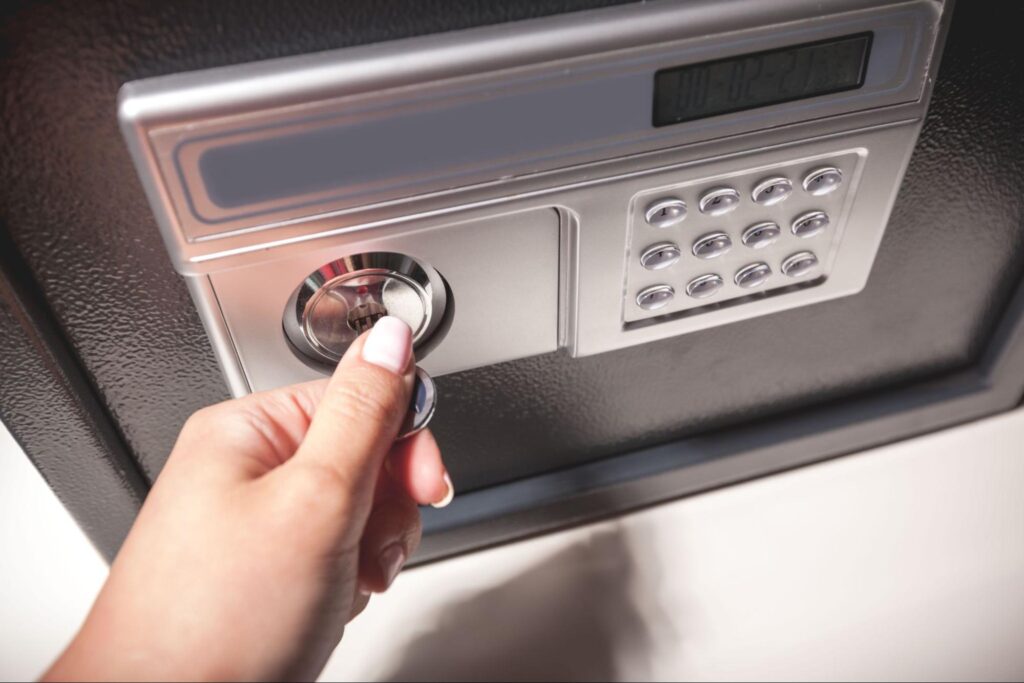Vacations should be a time of excitement and relaxation—not overshadowed by worries about your home’s security. However, concerns about unattended risks like break-ins, water damage, or severe weather are natural. True peace of mind comes from a comprehensive approach that layers physical security to deter intruders, proactive damage prevention to guard against environmental hazards, and the vital financial protection of a solid insurance policy.
This guide provides practical tips to safeguard your property on all three fronts. By implementing these key measures, you can ensure your home is protected from unexpected events, allowing you to focus on enjoying your trip.
Fortifying Your Home Against Intruders

A strong defense against intruders relies on a layered strategy that combines physical barriers, clever tactics to make your home appear occupied, and modern technology. By integrating all three, you can create a formidable deterrent to would-be burglars.
Strengthen Your Physical Security
The first line of defense is ensuring your home is physically difficult to enter. Many break-ins are crimes of opportunity, so even basic reinforcement can make a significant difference.
- Secure All Entry Points: Reinforce all exterior doors with Grade 1 deadbolt locks, which provide the highest level of security. Don’t overlook sliding glass doors; supplement their weak latches with a security bar or an auxiliary lock.
- Don’t Forget Windows: Lock all windows, especially on the ground floor. For added protection, you can install secondary locks like pin locks, sash jammers, or window bars. Security film can also be applied to glass to make it harder to shatter.
- Secure Detached Structures: Sheds and garages are common targets because they are often less secure and contain valuable tools that can be used to break into your main house. Use high-quality padlocks on sheds and ensure any door leading from an attached garage into your home is as secure as your front door.
Create the Illusion of Occupancy
A home that looks empty is a prime target. Simple, traditional methods can effectively signal that someone is home.
- Manage Mail and Deliveries: A mountain of mail or a pile of newspapers on the doorstep is a clear sign of an empty house. Use the USPS Hold Mail service or ask a trusted neighbor to collect your items daily.
- Use Timers for Lights and Electronics: One of the most effective ways to mimic activity is by using timers or smart plugs for lamps, radios, and televisions. Schedule them to turn on and off in different rooms throughout the evening to simulate a natural routine.
- Maintain Your Yard: An overgrown lawn or a snow-covered driveway suggests neglect and absence. Arrange for lawn care or snow removal to maintain your home’s usual appearance.
- Keep a Car in the Driveway: If possible, leave a car in the driveway or ask a neighbor to park one of theirs there periodically.
Leverage Modern Home Security Technology
Technology offers a dynamic and powerful layer of protection, allowing you to monitor and control your home’s security from anywhere in the world.
- Install a Smart Security System: Modern systems go far beyond basic alarms. They can include a suite of devices like video doorbells, motion detectors, and door and window sensors that send real-time alerts directly to your smartphone if any unusual activity is detected.
- Utilize Smart Lighting and Automation: Smart home technology allows you to control more than just security devices. You can manage lights, automated blinds, and smart plugs remotely from an app, giving you the ability to create a convincing illusion of occupancy on the fly.
- Consider Advanced Solutions: For even greater peace of mind, AI-driven sensors can learn your home’s typical activity patterns and flag anomalies, such as a door opening at an unusual time. While a larger investment, these integrated systems provide comprehensive oversight and can often be managed from a single, user-friendly dashboard.
Preventing Environmental and Internal Damage
Beyond security from intruders, protecting your home from internal and environmental hazards is crucial to prevent costly damage while you are away. An undetected leak or electrical issue can quickly escalate into a major disaster.
Guarding Against Water Damage
An undetected water leak can cause catastrophic damage in a short time. To mitigate this risk, take the following precautions:
- Shut Off the Main Water Supply: For extended trips, this is the most effective way to prevent major plumbing failures. If you are concerned about your irrigation system or other needs, you can shut off the water supply to individual appliances like the washing machine and dishwasher.
- Prepare for Cold Weather: In colder months, prevent pipes from freezing by keeping your thermostat set to at least 55°F (13°C) and insulating pipes in unheated areas like basements or crawl spaces.
- Install Smart Leak Detectors: Place these devices near water heaters, sinks, and sump pumps. They can send an immediate alert to your phone if moisture is detected, allowing you to arrange for a quick response.
- Ensure Your Sump Pump Works: If your home has a sump pump, test it before you leave and consider installing a battery backup to keep it running during a power outage.
Electrical and Fire Safety Precautions
Minimize the risk of electrical malfunctions and fires with these simple but effective steps:
- Unplug Non-Essential Electronics: Disconnect appliances like coffee makers, toasters, and computers. This reduces the risk of an electrical fire and protects them from power surges.
- Check Your Detectors: Before you leave, test all smoke and carbon monoxide detectors and replace their batteries if needed. For ultimate peace of mind, use smart detectors that send alerts to your phone.
- Use Surge Protectors: For essential devices that must remain plugged in, ensure they are connected to a high-quality surge protector. For a more robust solution, consider a whole-house surge protector, especially if your area experiences frequent power fluctuations.
Preparing for Severe Weather
Your home’s exterior is its first defense against the elements. Ensure it’s ready for any potential storms.
- Inspect Your Roof and Gutters: Look for loose shingles or flashing that could be vulnerable to high winds. Clear your gutters and downspouts to ensure rainwater can drain properly, preventing water from backing up and seeping into your roof or foundation.
- Secure Your Yard: Store or secure outdoor furniture, grills, planters, and any other items that could become dangerous projectiles in a storm.
- Consider Storm Protection: If you live in an area prone to hurricanes or severe wind, investing in storm shutters or impact-resistant windows can provide an essential layer of protection against debris and heavy rain.


Your Community: An Essential Home Security Asset
While technology and physical barriers are crucial, your most valuable and reliable security asset might live right next door. An active and engaged community creates a powerful deterrent that technology alone cannot replicate. Fostering these human connections is a simple, cost-effective way to protect your home.
Enlist a Trusted Neighbor or Friend
A trusted neighbor is your first line of defense in making your home look naturally lived-in. Before you leave, ask someone you trust to:
- Collect Mail and Packages: An overflowing mailbox or a stack of packages on the porch is a clear signal that no one is home.
- Maintain Appearances: Ask them to roll your trash and recycling bins to the curb on collection day and bring them back in afterward.
- Keep an Eye Out: Neighbors are familiar with the daily rhythm of the area and can quickly spot unusual activity, such as an unfamiliar vehicle or strangers on your property.
Provide them with your contact information and a spare key or security code for emergencies. This simple, reciprocal arrangement not only secures your home but also strengthens neighborhood bonds.
Hire a Professional House Sitter
For longer trips, or if you have pets or plants that need care, hiring a house sitter is an excellent option. A live-in presence is the ultimate deterrent, as it eliminates any signs of vacancy. A professional house sitter ensures your home is cared for, your routines are maintained, and someone is immediately available to handle unexpected issues, from a tripped breaker to a minor leak.
Be sure to use a reputable service or a trusted referral and provide them with a clear set of instructions and emergency contacts.
Leverage the Power of Neighborhood Vigilance
The most secure communities are those where residents look out for one another. Get involved to create a collective network of security:
- Participate in a Neighborhood Watch: These programs formalize communication between residents and local law enforcement, creating an organized front against property crime.
- Join a Community Communication Group: Digital platforms like Nextdoor or a simple neighborhood group chat allow for the rapid sharing of information about suspicious activity.
- Build Relationships: Simply knowing your neighbors and having their contact information makes it easier to alert each other to potential problems.
Ultimately, a neighborhood where people are connected and observant is a powerful deterrent. These collective eyes and ears create a web of security that makes the entire community safer for everyone.
Protecting Your Valuables and Digital Footprint

While securing your home’s perimeter is essential, protecting your most prized possessions and personal information requires another layer of careful planning. This involves safeguarding tangible assets within your home and managing the digital signals you send out to the world.
Secure Your High-Value Items
Some possessions, like jewelry, critical documents, and irreplaceable heirlooms, deserve extra protection beyond a locked door.
- Invest in a Quality Safe: A fireproof and waterproof safe is the best place for important documents, valuable jewelry, and small electronics. For maximum security, ensure the safe is bolted to the floor or a wall, preventing a thief from simply carrying it away.
- Use Off-Site Storage: For items of extreme value or sentimental importance, consider a safe deposit box at a bank. This is the most secure option for things you don’t need regular access to.
- Create Digital Copies: Scan important documents and photos and store them in a secure, encrypted cloud service or on an external hard drive that you keep in a separate, safe location.
Create a Detailed Home Inventory
In the unfortunate event of a theft or disaster, a home inventory is an invaluable tool that can simplify and expedite your insurance claim.
- Document Everything: Go room by room and systematically record your belongings. The easiest way is to take a video, narrating as you go, and supplement it with photos of high-value items.
- Record Key Details: For electronics, appliances, and other expensive items, note the make, model, serial number, and approximate purchase date. Keep receipts for major purchases with your inventory.
- Store It Safely: Your inventory won’t help if it’s destroyed in the same event as your belongings. Store a digital copy in the cloud, email it to yourself, or keep a copy on a flash drive at your office or with a trusted family member.
Be Cautious with Your Social Media
In today’s connected world, one of the biggest signals that you’re away isn’t a pile of mail—it’s your social media feed. Broadcasting your vacation plans or posting real-time updates is like putting up a sign that says, “My home is empty.”
- Wait to Share: The safest rule is to delay posting photos, videos, and status updates until you are back home. Sharing your vacation memories after the fact is just as enjoyable and far more secure.
- Check Your Privacy Settings: Ensure your posts are only visible to trusted friends and family, not the public. Be mindful of location tagging, which can reveal your exact whereabouts.
- Inform Your Family: Remind everyone in your household, especially teenagers, about the risks of publicizing travel dates or locations online. A unified approach is key to protecting your home.
The Critical Role of Home Insurance
No matter how carefully you prepare, some risks are simply beyond your control. A sudden storm, a burst pipe, or a determined burglar can bypass even the best-laid plans. This is where home insurance transitions from a simple policy to an essential financial safety net, providing the ultimate peace of mind that allows you to truly relax and enjoy your time away.
Why a Comprehensive Policy is Essential
A standard policy might not cover everything you assume it does. A truly comprehensive policy is your shield against the significant out-of-pocket expenses that can follow an unexpected event. It should adequately cover:
- Your Home’s Structure: This protects you from the cost of repairing or rebuilding your home after damage from events like fire, wind, or certain types of water damage.
- Your Personal Belongings: In the event of a theft or disaster, this coverage helps you replace everything from furniture and electronics to clothing. This is where the home inventory you created becomes invaluable in streamlining your claim.
- Liability Protection: If someone is injured on your property while you’re away (like a neighbor checking on your home), liability coverage can protect you from potentially devastating legal and medical costs.
- High-Value Items: Standard policies often have low coverage limits for items like jewelry, art, or collectibles. An endorsement or rider can be added to ensure these prized possessions are insured for their full value.
Reviewing and Updating Your Coverage Before Travel
Your insurance needs are not static. An annual policy review is a good habit, but a quick check-in with your agent before a vacation is even better. This is the perfect time to:
- Confirm Your Coverage is Current: Have you recently renovated your kitchen, finished your basement, or made any significant purchases? Ensure your coverage limits reflect the current value of your home and belongings.
- Discuss Your Travel Plans: It is crucial to inform your agent about extended trips. Some policies have specific conditions or exclusions for homes left unoccupied for a prolonged period (often 30 days or more). A quick conversation can prevent a denied claim.
- Understand Your Deductibles: Know exactly what your out-of-pocket cost will be if you need to file a claim. This ensures there are no financial surprises during an already stressful time.
The Value of an Independent Insurance Agent
Navigating policy details, endorsements, and coverage limits can be complex. That’s where the right partner makes all the difference. Unlike agents who represent a single company, an independent insurance agent works for you.
At Torian Insurance, we shop multiple carriers to find a policy that is tailored to your home’s unique features, your budget, and your regional risk profile. As a locally owned firm, we have deep knowledge of the specific hazards in Southern Indiana and surrounding areas. This insight allows us to craft a policy that addresses everything from regional weather patterns to specialized coverage for your unique possessions. Let us handle the complexities of your coverage, so you can focus on packing your bags.
Home Security: Peace of Mind for Every Vacation
Vacations should be a time for joy and relaxation, not lingering anxiety. By securing entry points, leveraging smart technology, and proactively maintaining your property, you can significantly reduce risks while you’re away. A thorough review of your home insurance policy adds another layer of protection against unforeseen events, ensuring you’re well-prepared for whatever might happen.
For expert guidance on tailoring your home insurance to your specific needs, contact Torian Insurance. With personalized solutions and decades of trusted service, we are committed to safeguarding your peace of mind while you enjoy your vacation.



